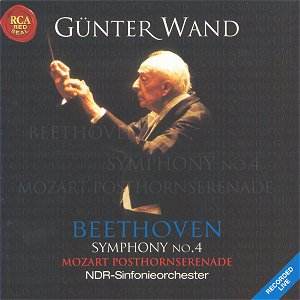The recent death of Günter Wand feels like the
end of an era [obit].
He was one of the enduring figures of twentieth century music, who is
in his later years specialised increasingly in performing and recording
the music he loved most. The composers who meant most to him all came
from the great Viennese and post-Viennese tradition: Mozart, Haydn,
Beethoven, Schubert, Brahms and above all, Bruckner. Yet as a younger
man his tastes were eclectic. For example, in the late forties he gave
the European premiere of Messiaen's Turangalila Symphony.
This RCA issue of major works by Mozart and Beethoven
uses live performances, and very fine they are too. Recorded in Hamburg
in April 2001, they have a vitality and tonal lustre which marks them
as interpretations of the highest order, well served by the recording
engineers.
Mozart's Posthorn Serenade is a large scale work, some
48 minutes of music across a seven-movement plan involving two minuets,
a concertante and a full sonata form opening movement. The latter, with
its splendid Maestoso introduction, is arguably the finest purely instrumental
music Mozart composed during his years at Salzburg, up to 1780. Wand
revels in this wonderful score, finding vitality and tenderness as appropriate;
never do his tempi feel the least mannered. As for the posthorn itself,
this accounts for just a few bars in the trio section of the second
minuet, representing a coded message that the end of term had come and
the students could make their way home by the post-chaise. The balance
of the special instrumental effect is superbly captured by the engineers,
and so too is the exciting tempo Presto of the finale.
It is only some ten years since the same orchestra
and conductor offered us Beethoven's Fourth Symphony in a studio recording,
then coupled with a vital performance of the Second. But this performance
is splendidly played and beautifully judged in matters of phrasing and
balance, and the RCA recording captures a live event in its special
atmosphere. If there is a caveat it applies to the slow movement Andante,
in which tensions are not wholly maintained. But any doubts are soon
swept away once the ebullient music of the scherzo arrives, and this
directness carries over into the finale. This Wand phrases to perfection,
allowing the shaping of Beethoven's subtle, but witty, themes to gain
clear articulation and maximum communication.
Terry Barfoot


